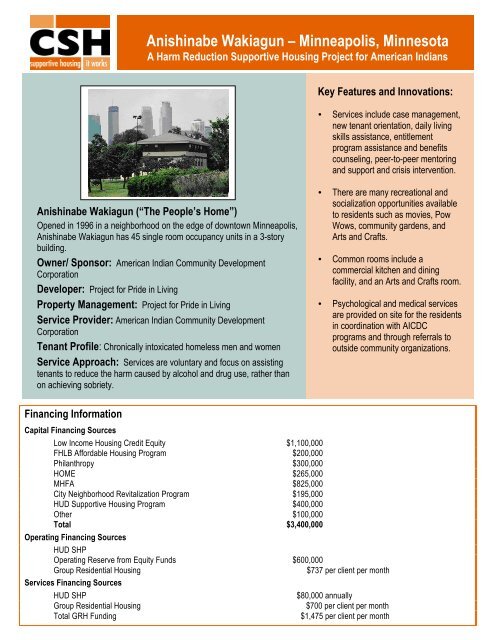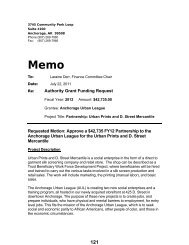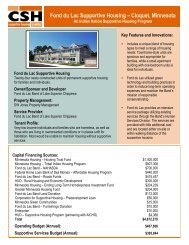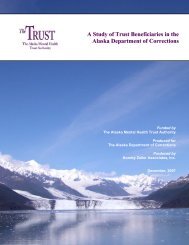Anishinabe Wakiagun â Minneapolis, MN
Anishinabe Wakiagun â Minneapolis, MN
Anishinabe Wakiagun â Minneapolis, MN
Create successful ePaper yourself
Turn your PDF publications into a flip-book with our unique Google optimized e-Paper software.
<strong>Anishinabe</strong> <strong>Wakiagun</strong> – <strong>Minneapolis</strong>, Minnesota<br />
A Harm Reduction Supportive Housing Project for American Indians<br />
Key Features and Innovations:<br />
• Services include case management,<br />
new tenant orientation, daily living<br />
skills assistance, entitlement<br />
program assistance and benefits<br />
counseling, peer-to-peer mentoring<br />
and support and crisis intervention.<br />
<strong>Anishinabe</strong> <strong>Wakiagun</strong> (“The People’s Home”)<br />
Opened in 1996 in a neighborhood on the edge of downtown <strong>Minneapolis</strong>,<br />
<strong>Anishinabe</strong> <strong>Wakiagun</strong> has 45 single room occupancy units in a 3-story<br />
building.<br />
Owner/ Sponsor: American Indian Community Development<br />
Corporation<br />
Developer: Project for Pride in Living<br />
Property Management: Project for Pride in Living<br />
Service Provider: American Indian Community Development<br />
Corporation<br />
Tenant Profile: Chronically intoxicated homeless men and women<br />
Service Approach: Services are voluntary and focus on assisting<br />
tenants to reduce the harm caused by alcohol and drug use, rather than<br />
on achieving sobriety.<br />
• There are many recreational and<br />
socialization opportunities available<br />
to residents such as movies, Pow<br />
Wows, community gardens, and<br />
Arts and Crafts.<br />
• Common rooms include a<br />
commercial kitchen and dining<br />
facility, and an Arts and Crafts room.<br />
• Psychological and medical services<br />
are provided on site for the residents<br />
in coordination with AICDC<br />
programs and through referrals to<br />
outside community organizations.<br />
Financing Information<br />
Capital Financing Sources<br />
Low Income Housing Credit Equity $1,100,000<br />
FHLB Affordable Housing Program $200,000<br />
Philanthropy $300,000<br />
HOME $265,000<br />
MHFA $825,000<br />
City Neighborhood Revitalization Program $195,000<br />
HUD Supportive Housing Program $400,000<br />
Other $100,000<br />
Total $3,400,000<br />
Operating Financing Sources<br />
HUD SHP<br />
Operating Reserve from Equity Funds $600,000<br />
Group Residential Housing<br />
$737 per client per month<br />
Services Financing Sources<br />
HUD SHP<br />
Group Residential Housing<br />
Total GRH Funding<br />
$80,000 annually<br />
$700 per client per month<br />
$1,475 per client per month
About the American Indian Community Development Corporation<br />
American Indian Community Development Corporation (AICDC) is an outgrowth of the American Indian Task Force on<br />
Housing and Homelessness, which formed around 1991 to identify housing needs for the homeless American Indian<br />
population in <strong>Minneapolis</strong>. The Task Force determined that the sub-group of chemically dependent single adult American<br />
Indian men and women were the most underserved in the Twin Cities. In response to that need, the AICDC was<br />
incorporated in 1992. Their mission statement is “to provide culturally unique initiatives, housing, and entrepreneurial<br />
programs that strengthen American Indian communities.” AICDC was formed to focus primarily on housing and community<br />
development. However, in recognition of the inability of the American Indian population to successfully achieve adequate<br />
housing or maintain residential stability, staff began to develop programs that would successfully provide housing and<br />
support services while addressing chemical health issues for these individuals and families.<br />
About Project for Pride in Living<br />
Founded in 1972, Project for Pride in Living (PPL) is a nonprofit organization dedicated to helping lower-income families<br />
develop the tools they need to achieve self-sufficiency. PPL’s earliest activities were devoted to increasing the supply of<br />
affordable, quality housing as a stabilizing force in the inner-city neighborhoods of <strong>Minneapolis</strong>. Today it offers affordable<br />
housing and support services to people in poverty, and owns or manages more than 800 units of affordable housing. PPL’s<br />
mission is to assist lower-income individuals and families to work toward self-sufficiency by providing housing, jobs and<br />
training. They create opportunities for growth through several integrated programs: affordable housing (rental and<br />
ownership), jobs and employment readiness training, personal and community support services, and youth development.<br />
About CSH and <strong>Anishinabe</strong> <strong>Wakiagun</strong><br />
<strong>Anishinabe</strong> <strong>Wakiagun</strong> was one of the first supportive housing projects that CSH assisted with in <strong>Minneapolis</strong>. CSH helped<br />
conceptualize the project, identify development partners, formalize partnerships, identify funding sources (including<br />
securing under-used GRH programs through out the state), and helped to build political and community support for the<br />
project. CSH also provided capacity building grants and predevelopment funds for the development.<br />
About CSH<br />
The Corporation for Supportive Housing (CSH) is a national non-profit organization and community development financial<br />
institution that helps communities create permanent housing with services to prevent and end homelessness. Founded in<br />
1991, CSH advances its mission by providing advocacy, expertise, leadership, and financial resources to make it easier to<br />
create and operate supportive housing. CSH seeks to help create an expanded supply of supportive housing for people,<br />
including unaccompanied adults, families with children, and young adults, who have extremely low-incomes, who have<br />
disabling conditions, and/or face other significant challenges that place them at on-going risk of homelessness. For<br />
information regarding CSH’s current office locations, please visit www.csh.org/contactus.<br />
Corporation for Supportive Housing<br />
2801 21 st Avenue S., Suite 230<br />
<strong>Minneapolis</strong>, <strong>MN</strong> 55407<br />
T: 612-721-3700<br />
F: 612-721-9903<br />
E: mninfo@csh.org<br />
www.csh.org





